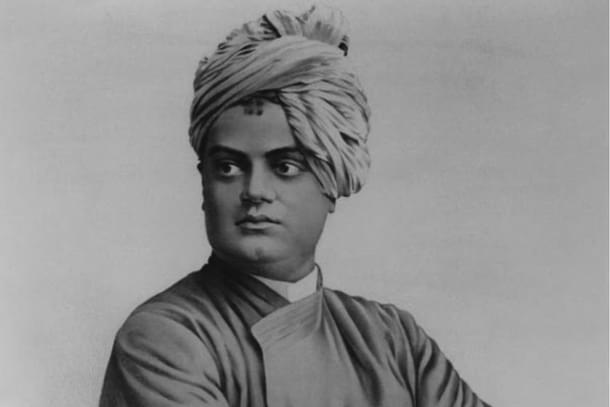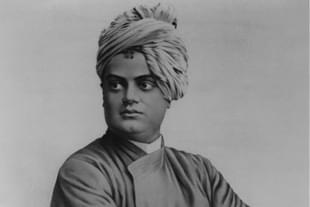Ideas
Swami Vivekananda And Maharishi Manu
Aravindan Neelakandan
Jan 12, 2025, 02:17 PM | Updated Feb 11, 2025, 02:04 PM IST
Save & read from anywhere!
Bookmark stories for easy access on any device or the Swarajya app.


Manu is an ancient archetypal figure in the Hindu tradition.
The Rig Veda (RV) speaks of a Manu. He established Agni in the Yajna to bring the divine godheads (RV 1.13.4). He instituted the sacrifice (RV 1.44.11).
He personified humanity, as he was an ancient human being of knowledge (RV.1.139.9). Vedic Gods Rbhus were his very human progeny (RV 3.60.3) who through good deeds became Gods.
Sri Aurobindo in his commentary on the Rig Vedic hymns to mystic fire, speaks of Manu as the human in the evolutionary pathway.
According to Sri Aurobindo Manu is ‘Man the Doer … perfecting himself by works, is lifted by the divine will to Vijnana, to the ideal self of true knowledge, right action and emotion’ thus ascending to the ‘Tapas where Agni is’.
Thus, Manu of the Vedas symbolises an important evolutionary jump – manifestation of a virtue that though found abundantly in non-human organisms, became the defining feature of human evolution.
This virtue is revealed in subsequent Hindu sacred texts as in Satapatha Brahmana (SB, 1.8.1) and in Mahabharata (MB Vanaparva-Markandeya Samasya Parva). There are similarities and a crucial difference though between the two narratives.
In both the fish is a helpless, small creature, almost insignificant in size. In both the fish and Manu meet when the latter is doing austerities or preparing for ablutions. In SB, in the very beginning of the encounter itself, the fish declares that if Manu helps it, it would save him: ‘Preserve me: I shall save thee’. It could be considered as transactional.
On the other hand, in MB the appeal is only to the heart of Manu. There is only a footnote of a hint that it might repay the kindness.
Worshipful sir, I am a helpless little fish, I am afraid of the large ones; therefore, do you, O great devotee, think it worth your while to protect me from them; especially as this fixed custom is well established amongst us that the strong fish always preys upon the weak ones. Therefore, do you think it fit to save me from being drowned in this sea of terrors! I shall requite you for your good offices.Translation: Kisari Mohan Ganguli
In both the condition of big-fish-eat-small-fish is told by the fish and it beseeches Manu to save it from this condition of the animal realm.
As the well known story goes, the flood comes and Manu is saved by the fish.
A great Vedic scholar and one of the topmost civil servants of Mysore of early twentieth century, Mandayam Narayan Iyengar, in his insightful analysis of the narrative points out the deep Vedic symbolism encoded in the narrative:
... Sacrifice is metaphorically called Ship and as Manu means man, the thinker, the story seems to be a parable of the Ship of Sacrifice (Yajna) being the means for man's crossing the sea of his duritas, sins and troubles. The Fish that conducts the Ship seems to me to be Agni, the symbol of all-embracing God. The spiritual Agni is believed to be present not only in the solar light removing darkness from the day but also in the light of the moon and in fire or lamplight itself, both representing the dual deities Soma and Agni removing darkness from night. ... (A)s Antaryami the spiritual Agni is the Child of the waters and ... for that reason the porpoise fish Sisumara was selected as a metaphor for him. For the same reason the large fish Jhasha is selected here to represent Him whose delight consists in universal love.Essays on Indo-Aryan Mythology, 1901, p.122
From this Iyengar sees the small fish being troubled by the menacing bigger fish to itself becoming the gigantic fish saving all as the human shallowness giving way to expansion of the spirit through empathy.
Selfishness of humans makes humanity ‘small, limited, mutually antagonistic entities, swallowing one another under the principle of might is right’. That is the animalistic human. He has not outgrown the competition and selfish aggression as the most important survival tools.
Manu the thinking man differs and ‘must regard all creatures as himself’ and ‘he himself becomes them all for the purpose of his universal love.’
So, the water that is brought to Manu seems to be the water of knowledge. In it the Supreme Self is found as a small fish, but growing gradually in the realm of the heart according as man’s soul expands in love until his love becomes universal. The vast Fish that is thus cultivated and realised is able to conduct the Ship of Sacrifice across the sea of the duritas of the selfish world of strife.ibid., pp.123-4
Then Iyengar points out that if seen in the light of this inner meaning then it becomes clear that it is through the Yajna that Manu ‘got a wonderful daughter who calls herself Benediction or Blessing, and who is Ida’ which means ’libation, prayer, goddess of devotion’ representing ‘the blessedness of mind-born Sraddha’. Then Iyengar states the most important implication that is present in the text:
It should not be supposed that what Manu did is the miracle of the good old days not possible to be achieved by any other. The story concludes by clearly saying that anybody may do as Manu did and get the same offspring.ibid., p.124
What does this have to do with Swami Vivekananda?
During the time Swami Vivekananda arose on the spiritual horizon of humanity, Charles Darwin had already taken the world by storm. Evolution was changing the mindscape of humanity and the religious paradigm was undergoing a heavy churning.
Western world that had the foundations of its prosperity in imperialism and colonialism, not to mention the notions of racial superiority, had created out of the scientific discovery of Darwinian evolution, the pseudoscientific social Darwinism.
Social Darwinism justified a man-eat-man world. It justified racism and racial purging and enslaving of what were considered as ‘inferior races.’ It justified colonial exploitation and saw the famines which were affected on the colonies as a kind of Darwinian-Malthusian necessities.
Cold-hearted inhumanity innate in colonialism was rationalised as having a scientific basis.
In such a scenario, Swami Vivekananda confirmed evolution but rejected social Darwinism:
Again, we often hear that it is one of the features of evolution that it eliminates evil, and this evil being continually eliminated from the world, at last only good will remain. That is very nice to hear, and it panders to the vanity of those who have enough of this world’s goods, who have not a hard struggle to face every day and are not being crushed under the wheel of this so-called evolution. It is very good and comforting indeed to such fortunate ones. The common herd may surfer, but they do not care; let them die, they are of no consequence.'Maya and Illusion' lecture delivered at London on 15th October, 1896
Such an argument Swami Vivekananda finds as ‘fallacious from beginning to end’.
To him evolution was that process through which ‘you and I, and plants and animals, and every particles of life that exists must reach the Infinite Ocean of Perfection.’ This has ethical implications for human evolution and its building of civilisations.
According to Swami Vivekananda, even though in the animal kingdom ‘such laws as struggle for existence, survival of the fittest, etc.’ appeared evident he thought that such a social Darwinian model ‘seemed true’ only to a ‘certain extent.’ But in human society ‘where there is the manifestation of rationality, we find the reverse of these laws.’ He says:
In the animal kingdom instinct prevails; but the more a man advances, the more he manifests rationality. For this reason, progress in the rational human kingdom cannot be achieved, like that in the animal kingdom, by the destruction of others! The highest evolution of man is effected through sacrifice alone.Dialogue documented in the diary of Sarat Chandra Chakravarty, 1898
The parallels between the Manu-fish encounter and the view of Swami Vivekananda on evolution, with respect to transition from the biological evolution to meta-biological evolution, are strikingly similar.
In both Manu’s encounter with the fish and in the view of Swami Vivekananda on evolution, the animal nature and the competition that prevails in the animal kingdom is recognised. Both Manu and Swami Vivekananda, separated by at least three thousand years, point out that in the human phase of evolution, with the emergence of the thinking man or Manu, the predominant law of evolution changes from competition to sacrifice for the benefit of the weak. By not eliminating the weak but by preserving them, the humanity actually becomes capable of surviving chaotic situations.
Decades after the samadhi of Swami Vivekananda, leading humanists of the West would also speak the same vision - the vision of a qualitative shift in evolution:
--Jonas Salk, the virologist who came up with Polio vaccine, wrote about human evolution being 'metabiological evolution'.
--Anthropologist and Christian mystic Teilhard de Chardin wrote about transition into 'noosphere' from biosphere.
--Julian Huxley, writing about future evolution of humanity, on the occasion of hundred years of the publication of Origin of Species, envisioned 'a science of human possibilities'.
Finally, Swami Vivekananda pointed out that we need not think that such great persons like Manu existed only in the hoary past. Talking to his devotee he explained:
Was it not purity and unselfish labour that made them Manu and Yajnavalkya, or was it something else? Well, we ourselves can be far greater than even Manu and Yajnavalkya if we try to; why will not our views prevail then? … the ancient Vedic customs must be remodelled according to the need of the society and the times, and passed under a new form in the land. … Keeping that basis intact, compile in the manner of the ancient Rishis the essential truths of them and supplement them with thoughts that are suited to the times; only take care that all races and all sects throughout India be really benefitted by following these rules. Just write out a Smriti like that.
These words were told to his disciple Sarat Chandra Chakravarti in the year 1899.
On January 11, 1950, just a day before the 87th birth anniversary of Swami Vivekananda, Dr. Bhimrao Ramji Ambedkar said this about the Hindu Code Bill he had drafted:
The present bill is progressive. This is an effort to try to have one civil law for all the citizens under the constitution of India. The law is based on the religious scriptures of the Hindus.Vasant Moon (trans.Asha Damle), Dr. Baba Saheb Ambedkar, National Book Trust, 1991:2002 p.192
[Post script: M.A.Narayan Iyengar, who held held high positions in the Mysore Civil Service, established Vedanta Society and was a great devotee of Holy Mother Sarada Devi. He later obtained sanyasa and became Swami Srivasananda at Sri Ramakrishna Ashram, Bangalore.]





